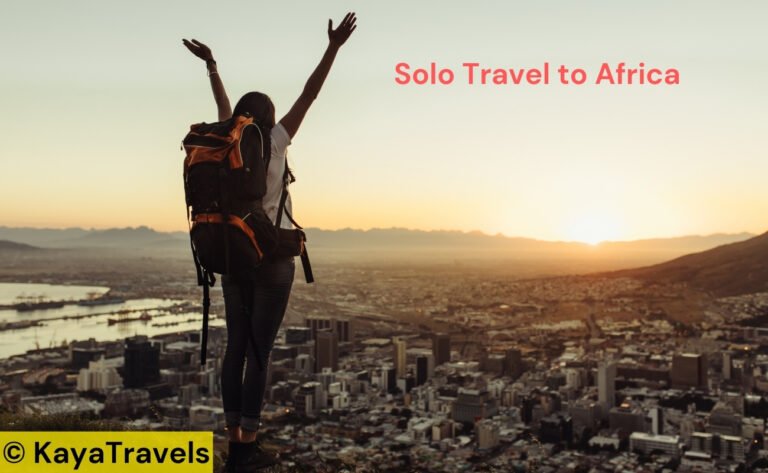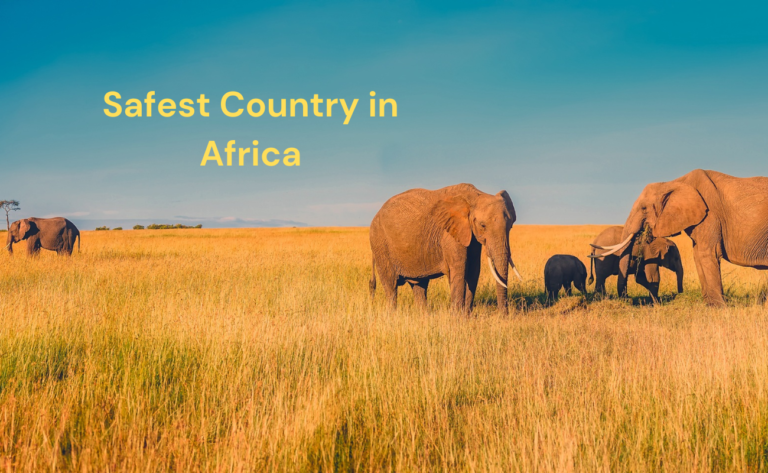Travelling alone to Africa is generally safe, although taking precautions and being aware of regional differences is essential. Africa is a diverse continent with 54 unique countries offering distinct cultures, landscapes, and experiences.
Like any travel destination, the level of safety can vary, and it’s essential to research the specific areas you plan to visit. Some countries are known for their peaceful environments and are often recommended for solo travellers’ adventure amidst stability.
When considering a solo trip to Africa, looking into various countries’ safety records and understanding potential risks is crucial. For example, Tanzania is noted for its hospitable locals and lower crime rates, making it a top choice for travellers.
On the other hand, staying informed about the travel advisories for countries experiencing conflict or unrest is advisable. Malaria, a concern across sub-Saharan Africa, is also a risk to consider, but this can be managed with proper precautions, including vaccines and mosquito prevention measures.
Before embarking on your solo journey, make a checklist of safety measures, such as registering with your embassy, keeping family and friends updated on your itinerary, and securing travel insurance. With thoughtful planning and situational awareness, your African adventure can be a safe and unforgettable experience.
Assessing Safety for Solo Travel in Africa
When you’re looking to quench your wanderlust with a solo trip to Africa, prioritizing safety is critical. Africa is a vast continent with varied safety profiles across different countries. To travel with confidence, consider the following aspects:
1. Check Travel Advisories: Always start by checking the latest travel advisories for the African countries you plan on visiting. These advisories provide crucial information on safety levels, ranging from Level 1 (exercise standard precautions) to Level 4 (do not travel).
2. Understand the Risks: While some African countries are known for political stability and low crime rates, others may experience occasional unrest or high petty crime rates. Ensure you’re well-informed about the specific risks associated with different regions within your destination country.
- Peace and Stability: Look for nations renowned for their stable governance and peaceful environments. Countries like Tanzania and Namibia are often considered safer options for solo travellers.
- Violence and Crime: Be aware of areas with higher rates of violence or crime. Always stay alert, especially in crowded or less-travelled areas.
3. Travel Insurance: Invest in comprehensive travel insurance for any solo journey. This provides a safety net for unforeseen incidents, from health emergencies to theft.
- Travel insurance plans vary, so choose one that covers your individual needs and the activities you plan to undertake.
4. Local Customs and Etiquette: It’s essential to respect local customs, which helps avoid unwanted attention. Dressing modestly and understanding social norms will ensure a smooth and respectful travel experience, especially in North African and predominantly Muslim countries.
5. Connect with Other Travelers: Solo doesn’t have to mean isolated. Connecting with other travellers can enhance your travel experience and offer additional security.
By taking these precautions and staying informed, you can safely enjoy Africa’s rich cultures, breathtaking landscapes, and unique wildlife. Remember, your safety is paramount, and preparation is the key to a successful solo adventure.
Read more about Solo Travel to Africa – Essential Tips for .
Best Practices for Planning Your Solo Trip
When embarking on a solo journey to Africa, your health, understanding of local cultures, and detailed planning of your itinerary and accommodations are critical to a safe and enriching experience.
Health Preparations
Before you travel, it’s crucial to consult with a travel health clinic. You’ll need to ensure your vaccinations are up-to-date, with common ones including:
- Hepatitis A and B
- Typhoid
- Yellow Fever (dependent on your destinations)
Also, Africa has regions with a high risk of malaria. Carry malaria prophylaxis as your doctor prescribes, use mosquito repellents, and sleep under treated nets if necessary.
Cultural Research
Understanding local customs is essential for your safety and enjoyment:
- Research local dress codes, especially in conservative areas, to avoid unwanted attention.
- Learn common phrases in the local language as a sign of respect to the locals.
- Study local laws and customs to avoid any legal issues.
Itinerary and Accommodations
It’s advisable to have a well-thought-out plan:
- Choose safe and reputable lodges or hostels by checking recent reviews.
- Pre-book accommodations and transport to ensure your destinations have secure, available lodging.
- Keep your itinerary flexible to allow for changes due to unexpected events, such as road closures.
Remember, each step is a stride towards making your solo trip to Africa memorable and safe.
Understanding and Mitigating Risks
When exploring Africa alone, staying informed and cautious can significantly reduce crime, health, and transportation risks.
Criminal Activity
Crime, incredibly petty theft, can occur anywhere. You can take steps to protect yourself:
- Stay Aware: Keep your belongings close, especially in crowded places.
- Choose Safe Accommodations: Research where you’re staying to ensure it has good security.
Muggings and violent crime are less common but more serious. To minimize these risks:
- Avoid Walking Alone at Night: Be in well-lit, populated areas.
- Stay Informed: Follow local news and advisories for any areas to avoid.
Health and Environmental Hazards
Diseases like malaria are a concern in sub-Saharan Africa. To protect yourself from mosquitoes:
- Use Insect Repellent: Apply it regularly.
- Sleep Under a Mosquito Net: Ensure your accommodations provide one.
Wild animals and natural hazards are also considerations:
- Follow Guidelines: Listen to your guide in nature reserves or when encountering wildlife.
- Stay Prepared: Bring a basic first-aid kit and learn about the local environment.
Navigating Local Transportation
Roads can be unpredictable, and travel methods vary:
- Plan Your Route: Research the streets and areas you’ll travel through.
- Use Reliable Services: Opt for reputable bus companies or services like Uber for safer travel.
Remember, each African country is different, so tailor your preparation to your destination.
Destinations and Activities in Africa for Solo Travelers
Travelling solo in Africa offers a unique blend of adventure, cultural experiences, and serene landscapes. Whether on a safari or soaking up the sun on the beach, Africa provides a safe and friendly environment to explore on your terms.
Wildlife and Nature Exploration
Africa is renowned for its wildlife safaris, where you can witness the majesty of animals in their natural habitats. Tanzania and Kenya are ideal for those seeking the classic safari experience, offering vast savannas and abundant wildlife, including the Big Five: lions, elephants, leopards, buffalo, and rhinos.
- Botswana excels in eco-friendly and luxury safari experiences, while South Africa combines safari with other attractions like Table Mountain and Cape Winelands.
- For a truly remote adventure, Ethiopia’s unique landscapes, such as the Simien Mountains, offer trekking opportunities and encounters with endemic species.
Cultural Immersion and Historical Sites
Ghana and Ethiopia are rich in cultural heritage and historical sites. Immerse yourself in the vibrant daily life and visit ancient landmarks:
- Don’t miss the chance to learn about Ashanti culture and the Elmina and Cape Coast historical forts in Ghana.
- Ethiopia is home to the rock-hewn churches of Lalibela and the ancient obelisks of Axum, which provide a window into a civilization dating back thousands of years.
Experience local customs and the community spirit, known in Swahili as “Ujamaa”, particularly in Tanzania, which contributes to a welcoming atmosphere for solo travellers.
Beaches and Coastal Retreats
Seeking a tranquil coastal escape? Africa’s beaches are as varied and spectacular as the continent itself.
- The pristine shores of Kenya’s Diani Beach invite you to relax or dive into the Indian Ocean to explore the vibrant coral reefs.
- South Africa’s coastline also beckons, with breathtaking beaches like Camps Bay, where you can sunbathe with a view of the Twelve Apostles mountain range.
For marine enthusiasts, Tanzania’s Zanzibar archipelago offers superb scuba diving and snorkelling experiences with its rich marine life and clear waters.
Is It Safe to Travel to Africa Alone?
Concerning solo travel in Africa, connecting with local individuals and other travellers can enhance your safety and enrich your experience.
Leveraging Social Networks for Safety
Connecting with others can be a safety net when travelling alone, particularly as a female traveller.
Social networks and travel apps are helpful tools you can use before and during your trip. Platforms like Couchsurfing allow you to meet locals willing to host you and give you local insights. Use the internet to join groups tailored explicitly to solo travellers and backpackers, where members often share safety tips and travel advice. For example:
- Join travel forums to ask questions or read about other solo traveller’s experiences in Africa.
- Look for Facebook groups for solo African travellers to connect with locals and expats.
Actionable Insight: Before your trip, connect with local people through these networks, arrange meet-ups, and inform someone about your whereabouts for additional safety.
Participating in Local and Expat Communities
Immersing yourself in local and expat communities can provide companionship and offer a deeper understanding of cultural nuances. Consider these approaches:
- Stay in hostels, hubs for solo travellers to meet and share experiences.
- Participate in community events or local activities where you can meet new friends.
Remember: While making new friends, always meet in public places and stay in control of your safety.
In Africa, embracing local experiences with open-mindedness and a sense of community can contribute significantly to a fulfilling and safe adventure.
Conclusion
Travelling to Africa alone can be a fulfilling and joyous adventure, enriched by diverse cultures and breathtaking landscapes. Ensure a memorable trip by following these pointers:
- Safety First: Africa is a vast continent with varying safety levels. Research your destination and follow local advice for a secure journey.
- Embrace Local Traditions: Engaging with the locals and their customs will enhance your experience. Remember to respect local dress codes, especially in regions like North Africa and Zanzibar.
- Stay Street-Smart: Like anywhere in the world, knowing your surroundings and keeping a low profile can prevent unwanted attention.
- Communal Warmth: In countries like Tanzania, the sense of community (‘Ujamaa’) often translates to lower crime rates and a welcoming atmosphere for solo travellers.
- Natural Wonders: From Tanzania’s snowy peaks to Malawi’s ‘Lake of Stars’, Africa offers endless natural beauty for explorers.
Travelling to Africa on your own could be one of the most rewarding experiences of your life. With a blend of common sense and cultural sensitivity, you can have a safe and spectacular adventure. Always keep your experiences joyous and your memories memorable!






